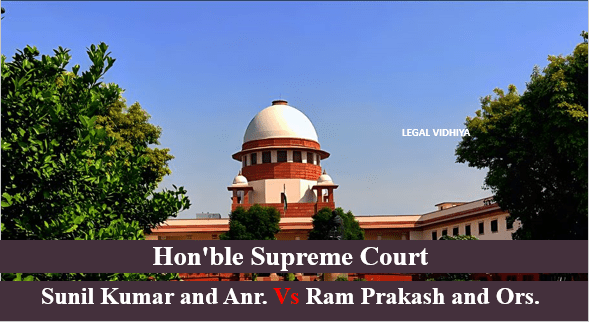
Sunil Kumar and Anr. Vs Ram Prakash and Ors.
Citations: 1988 AIR 576 1988 SCR (2) 623 1988 SCC (2) 77 JT 1988(1) 387 1988
Date of Judgement: 13 January, 1988
Court: Supreme Court of India
Case Type: Family law
Appellant: Sunil Kumar
Respondent: Ram Prakash
Bench: Ray, B.C. (J) Shetty, K.J. (J)
Referred: Sections- section 38 of Specific Relief Act
Facts:
- Ram Prakash signed into an arrangement with Jai Bhagwan to sell a dwelling property that was represented as a self-acquired property of Ram Prakash. On the day of the agreement, Jai Bhagwan paid Rs.5000 as earnest money and pledged to pay the rest on the date of the sale deed’s execution.
- Ram Prakash did not carry out the deal. Jai Bhagwan sued, seeking particular execution of the contract. The sons of Ram Prakash requested to be impleader as parties in that matter to contest the suit for a particular performance, but the court refused.
- Thereupon, they instituted a suit for a permanent injunction against their father, restraining him from alienating the property to Jai Bhagwan or anybody else, because the said house was their coparcenary property and the proposed sale was neither for legal necessity nor for the benefit of the joint family estate.
Issues:
- Whether a Karta can sell the joint family property even though the coparceners are against it?
- Whether there can be an injunction against the Karta for stopping the alienation from the joint family property.
Arguments:
- Bench: Ray, B.C. (J)
- At the request of the coparcener, they may obtain an injunction against the Manager of the joint Hindu family in the event of waste or expulsion.
- A permanent order against the alienation of the joint Hindu family’s property, even with legal necessity, cannot be issued.
- The managing member, also known as the Karta, has the authority to administer as well as alienate joint family property. The alienation might be for personal reasons or for the benefit of the estate.
- This type of alienation would bind the interests of all undivided family members, whether adults or kids, although this authority is not absolute. When alienation is challenged as being unreasonable or unlawful, the alienee must show that there was a legal requirement in actuality or that he undertook a proper and bona fide inquiry into the matter.
- It would be up to the alienee to show that he did everything he could to satisfy himself that such a requirement existed. The alienation would be deemed void if they proved it to be unwarranted.
- Only the Manager’s share may be sold to the buyer. In some areas, though, the buyer would not receive even that much. It would nullify the estrangement as a whole.
- The Karta should consider the actual burden on the joint family estate. It would be his responsibility to foresee the risk and prevent it.
Judgement:
1. After the trial court’s decision, the wife and children of Jai Bhagwan (his legal representatives) preferred an appeal.
– The Appellate Court held that a Coparcener had no right to maintain a suit for permanent injunction, restraining the Karta from alienating the coparcenary property. The coparceners had the right only to challenge the alienation of coparcenary property to recover the property after the alienation had come into being. Hence, the decision of the trial court was set aside.
After this decision the appellants, i.e., the sons of Ram Prakash appealed to the Court for relief by special leave against the decision of the High Court.
The court held that it is true that a coparcener by birth takes an interest in the ancestral property. but he is not entitled to separate possession of the coparcenary estate. A father as Karta of the Joint Hindu family has the power to Alienate the Joint Family Property for legal necessity or for the benefit of the estate as well as for meeting antecedent debts.
Court further stated that- the grant of such a relief will have the effect of preventing the father permanently from selling or transferring the property belonging to the joint Hindu family even if there is a genuine legal necessity.
Any coparcener may come up with such a suit for permanent injunction and the Karta will not be able to sell the property even for the legal necessity that suit is decided.
Yes, in case of waste or ouster, an injunction may be granted against the Karta of the Joint Hindu family at the instance of the coparcener, but a blanket injunction, restraining the Karta permanently from alienating the Coparcenary property even in the case of legal necessity, cannot be granted.
2. A Karta has power to alienate the joint family property in three special cases- legal necessity, benefit of estate, or for the performance of indispensable duties. For these purposes, a Karta need not take consent of other coparceners of the family, since he has the absolute right to manage the Joint property.
However, if the Karta wants to alienate the joint family property for purposes other than the three mentioned above. then the consent of all the coparceners is required.
– If the Karta goes ahead with the alienation without taking consent of all the other coparceners. the alienation would become void.
Conclusion:
- The coparcener has a sufficient remedy to challenge Karta’s alienation. As a result, he cannot seek an injunction preventing the Karta from alienating the coparcenary property in court under the Specific Relief Act.
Reference: https://lawplanet.in/sunil-kumar-vs-ram-prakash/
This article is written by Siddhant Raj of University of Allahabad, Intern in Legal Vidhiya.




0 Comments